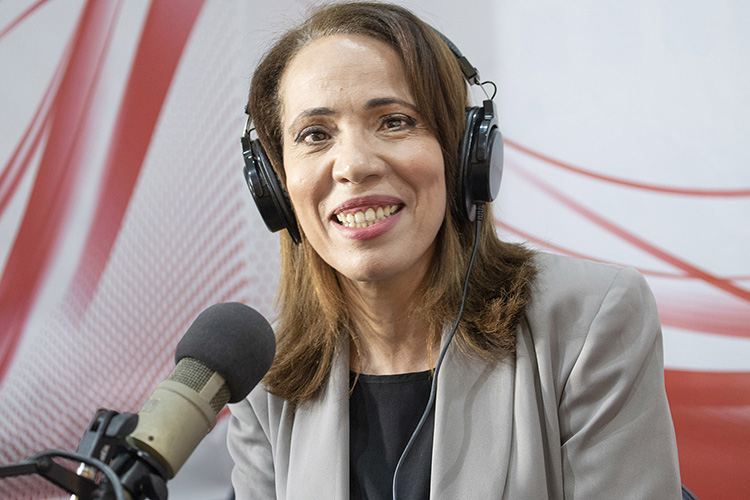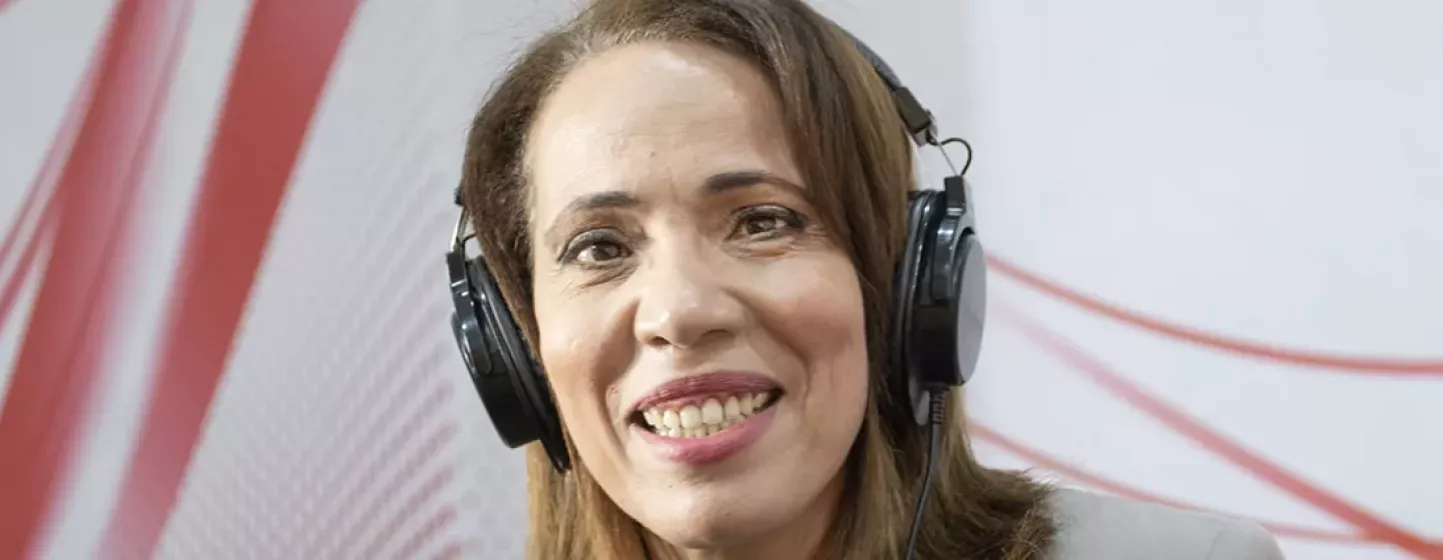Besma Essoussi, the voice of hope
Besma Essoussi presents several programmes at Tunis-based Radio ML and is vice president of the IBSAR association. She fights for the rights of women and people with disabilities. At 58 years old, she is almost completely blind, but more energised than ever before. Profile by Emmanuel de Solère Stintzy.
She's already there! Besma Essoussi is happily waiting for us well before the time we agreed for our meeting in Tunis. The perfect embodiment of her weekly programme on the rights of women and people with disabilities entitled Sourire d'espoir (A smile of hope). "Besma smiles with everyone before and after her programme. All the songs she chooses fit whatever topic was covered that day. She is so hard-working and professional that we have nicknamed her 'le sourire du travail' (the happy worker)," explains Sarra Fourti, her manager at Radio ML (Média Libre [Free Media], a community radio station), with a smile.
Besma is just diligent and incredibly busy: "I wish I had 48 hours in a day to get everything done. I can't live without reading, I've got commitments at home and the radio gives me a presence that is crucial for me because when I started to lose my eyesight, I became invisible. Everything I can't do on the radio, I try to do with the IBSAR association , of which I am the vice president."
Besma Essoussi's 25-year old daughter Eya Amemou, or "Youyou", appears to struggle to keep up with her mother's "boundless energy": "I call her 'mum on the move'! Sometimes she'll tell me at 1 o'clock in the morning that she 'has an idea'! She taught me and my sister about perseverance and the importance of being financially independent as women. She is happy as long as she is doing something. However, when she travels to different countries (editor's note: Russia, Qatar, USA, Morocco) for conferences, I still tell her to remember her age."
A second chance
Faced with Besma Essoussi's energy, it would be easy to forget that she is 58 years old and has retinitis pigmentosa, a serious hereditary illness that will gradually cause her to go completely blind: "I've lived two lives. Before I turned 35, I studied education and civilisation in Scotland and went on (editor's note: after obtaining her Master's degree in English from the Faculty of Literature of Manouba in Tunisia) to teach on a self-employed basis during my travels. I then spent 15 years in denial, trying to convince myself that I was perfectly fine even though I never left the house. And then, thanks to text-to-speech technology, I started reading digital news again. This second chance allowed me to dive headfirst into my programmes. Radio is like therapy for me and ultimately an opportunity to retrain in civil society offered by the Ministry of Education, which excluded me from working as a teacher as I could no longer see."
As a volunteer, Besma works hard to prepare for her programmes. She takes public transport, partly because she has to but also because it satisfies her curiosity about "the daily lives of others". Her manager, Sarra, is full of admiration for her: "She goes to every meeting about people with disabilities. She once fell into the sewer and broke her hip, yet she still walks more than I do and I am fully sighted!" Her uncomplicated nature also brings light into the day-to-day lives of her daughters and older sister, Jouda Soussi or "Joujou": "She will always be the pride and joy of our family. Her disability doesn't change that! She learned how to read at 3 years old and was always top of her class. When she was about 20 years old, she was already teaching English to students older than her. She has always been courageous, persuasive and a great communicator. I've got friends who are lawyers and doctors and they all look up to her and tune in to her programmes."
Small but inspiring initiatives
In addition to "Sourire d'espoir", which was broadcast for the first time in late 2017, Besma also plans to present another programme on Radio ML in late 2023. The fortnightly programme entitled Nous aussi on est des femmes (We are women too) will see a female expert answering questions from "marginalised women". Lastly, she has also been presenting a monthly programme dedicated to the elderly entitled "Je vous souhaite une belle et longue vie" [I wish you a long and wonderful life] since late 2022.
"On Wednesdays, which is when 'Sourire d'espoir' is broadcast, we have between 45,000 and 50,000 listeners. On other days, we normally have around 30,000. Besma receives a lot of calls and comments after each show," remarks her manager at Radio ML. Ever modest, the star presenter brings these numbers into perspective: "If I can be a role model to someone, that's great! I remember Aziza, a listener who was a student and had a visual impairment like mine. One of her wishes was to co-present a programme with me. We made that happen!"
However, Besma Essoussi is not the type of person to rest on her laurels and she never misses out on a training opportunity, just like the one offered by CFI through the PAMT2 project: "One thing I learned was how to work with other media outlets and find the information I was interested in, in a world full of misinformation. I'm also interested in boosting the radio station's exposure on social media without spending a fortune."
It's a great way to share new ideas without compromising your beliefs. Still smiling, the former English teacher adds: "I've always loved finding solutions. I'd like to focus on climate change in the future. I believe in the law of attraction and have no doubt that initiatives can be both small and inspiring."

In ten years…
Jouda Soussi sees her younger sister's destiny very clearly: "In ten years, I see her in politics, as she wants to help people and she knows how to make a difference. If she was in charge, people with disabilities would have more rights." Sarra Fourti, Besma Essoussi's manager at Radio ML, makes the same prediction: "Honestly, I can imagine her as an MP or minister, or perhaps even president! She could enact, amend or implement laws." Besma Essoussi's daughter, Eya Amemou, can see her mother "staying in communications because she is highly eloquent. As a consultant, she will no doubt always be involved in civil society. However, she wants to be where the action is, not to gain recognition or power. She wants to remain neutral and able to express herself freely, so I can't imagine her in politics!"
"Youyou" knows her mother well. "People with disabilities are always treated like sheep, even though we all hold our own political convictions. I don't want to risk losing a part of the community that doesn't share my ideas," explains Besma Essoussi. However, given that she always needs to be doing something, she is hatching many other plans: "I'll stay in the media until everyone is able to exercise their rights! Perhaps my English, Arabic and French language skills will enable me to be a reporter in other parts of the world. Even if, in ten years, I can see nothing at all, I'll be able to open other people's eyes so that they can see the value of people with disabilities," concludes Besma, who became an English teacher because she "dreamed of a life of travel".
